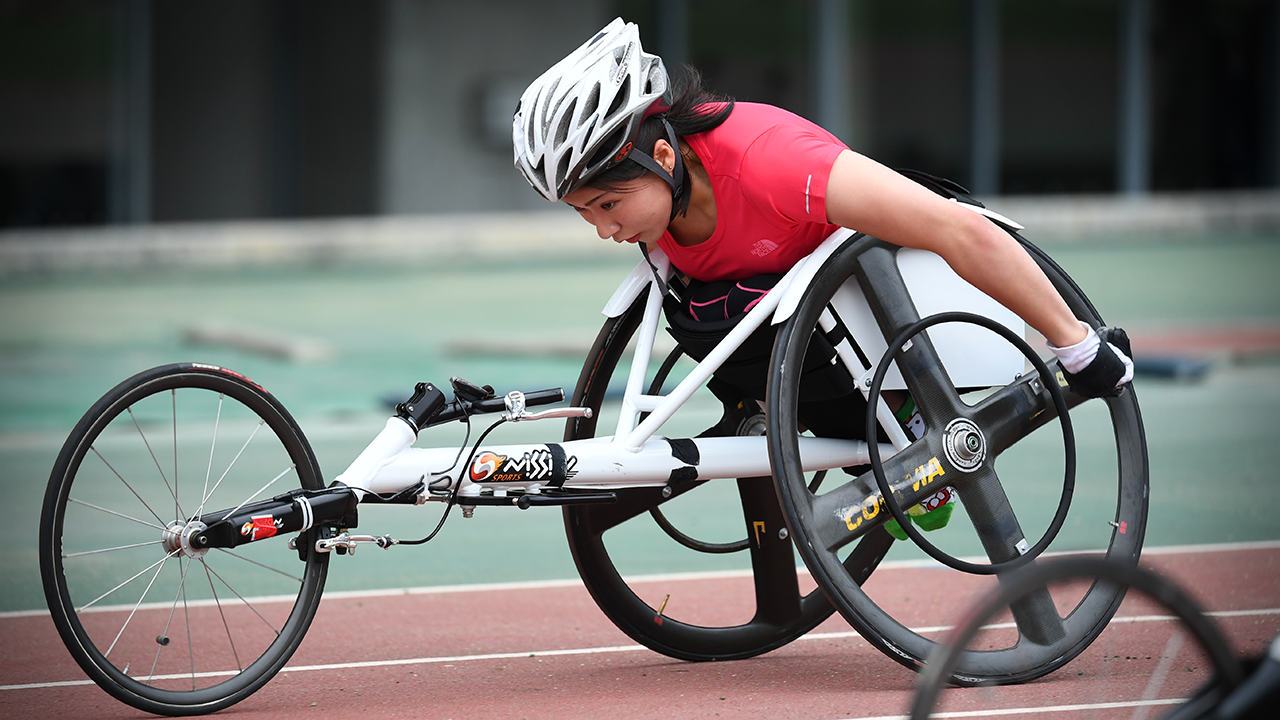
A natural talent to compete in two sports that blossomed as she grew. Supporting her all the way were friends she could trust and words that filled her with encouragement.

Athletes stand on the podium with the crowd cheering and cameras flashing. But they don’t make that happen just by themselves. Various people, from coaches, friends, colleagues, rivals, to families provide support with them, and behind a success or struggle, there are many different stories for each athlete. This athlete series highlights what enables athletes to take on challenges.
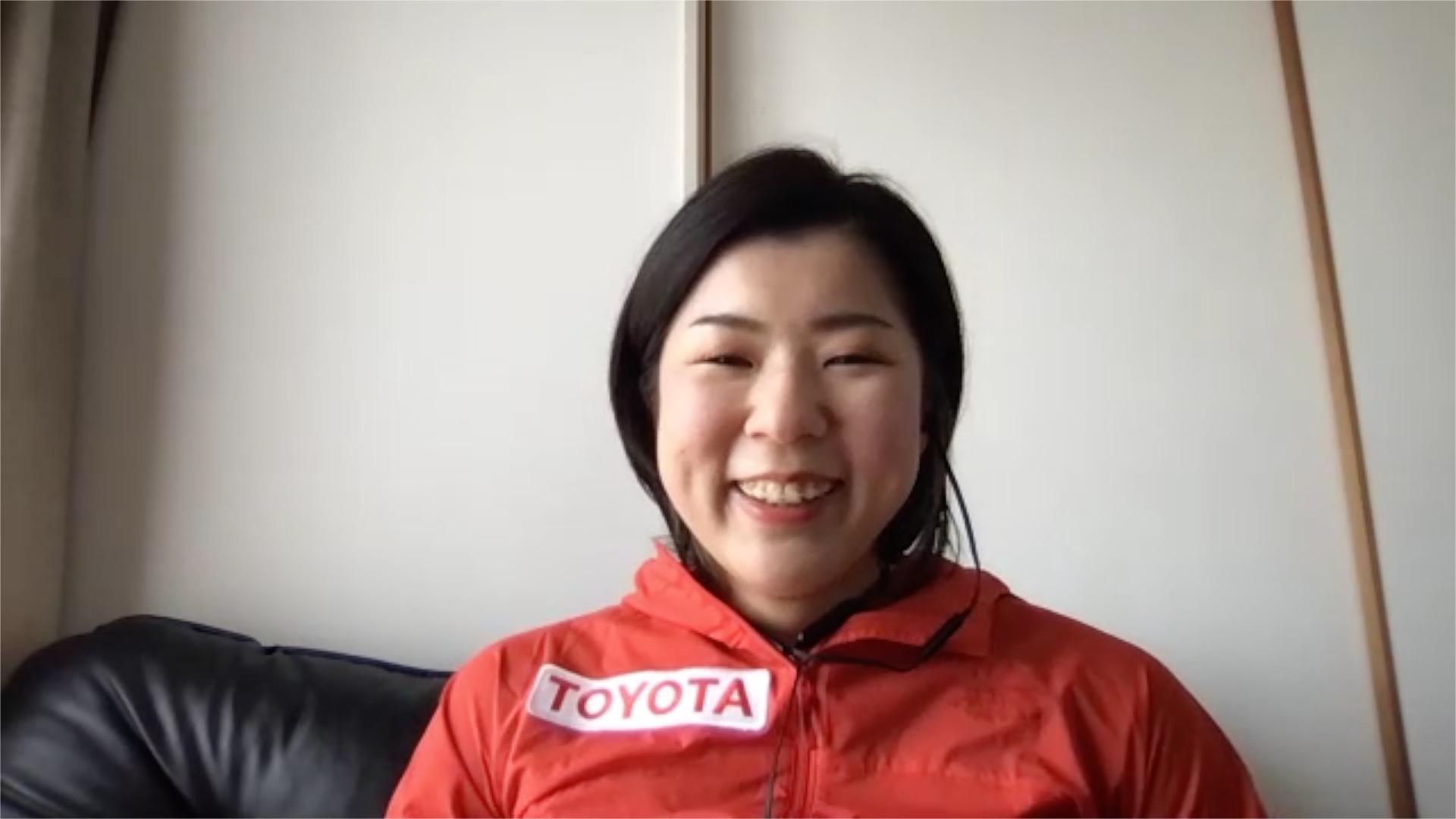
Participating in two sports—athletics and alpine skiing
If you were following sports articles in March 2021, you might have been forgiven for thinking that there are in fact two athletes who go by the name of Momoka Muraoka.
From March 9 to 13, Sugadaira 2021 World Para Alpine Skiing Asian Cup was held in Nagano Prefecture. Muraoka won the first place for Women's Super-G race, and she didn't stop there. In total, she won the first place for 5 out of 6 races such as Women’s Giant Slalom and Women's Slalom.
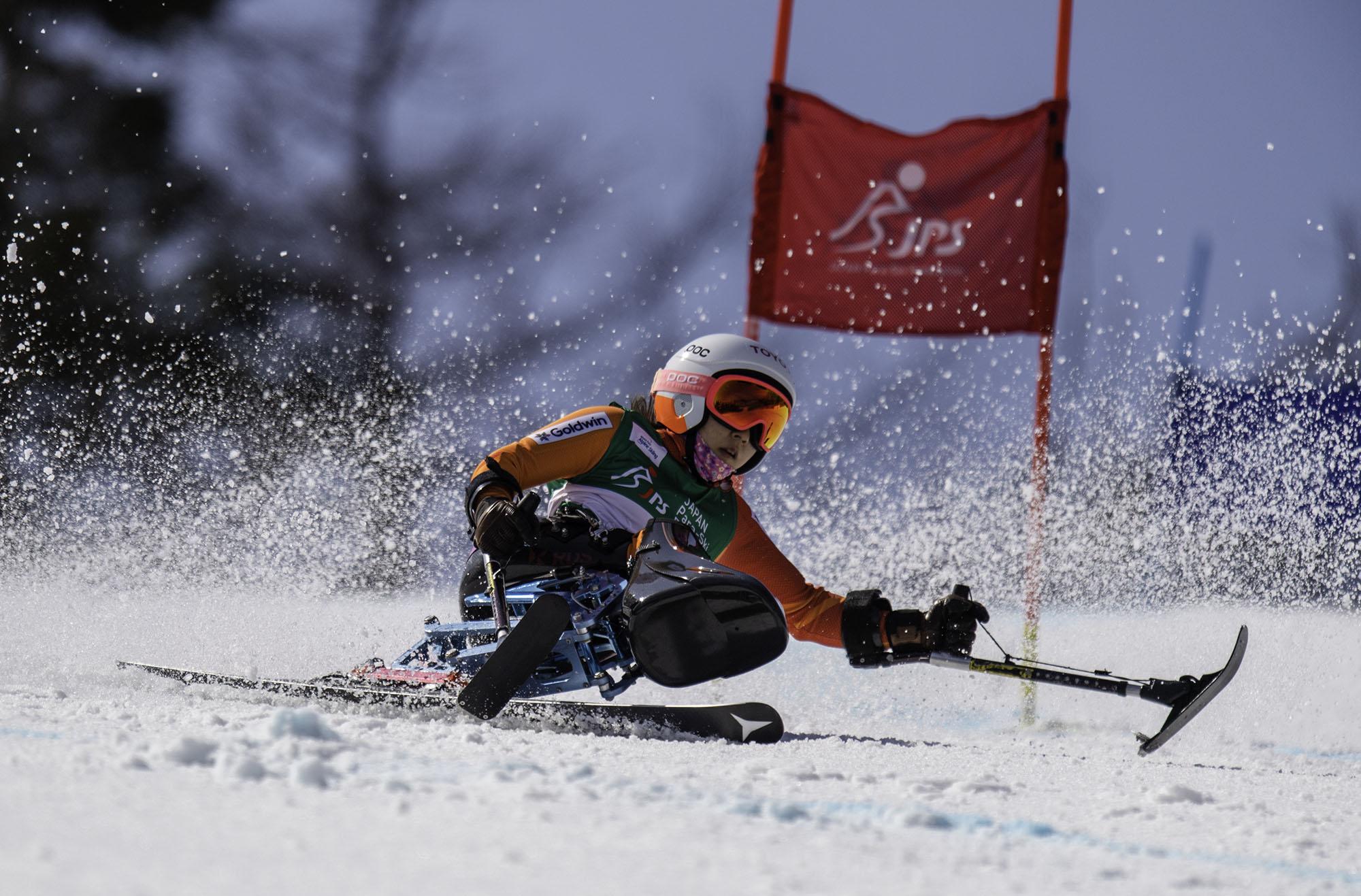
Fast forward to March 20 and the stage has moved to Komazawa Athletic Field in Tokyo, where the same person wins first place in two events, the women’s 100m and 400m (wheelchair T54 class) at the Japan Para Athletics Championship. In the space of just 10 days, Muraoka has conquered both snow-covered slopes and the athletics track.
There are great expectations for Muraoka as she goes for the double in athletics and alpine skiing, first at the Tokyo 2020 Paralympic Games in 2021 and then at the Beijing 2022 Paralympic Winter Games.
Reading this, you may think that Muraoka is a peerless and unbeatable queen of slope and track. In fact, she won five medals at the PyeongChang 2018 Paralympic Winter Games, including one gold medal, and also set a new record for Japan in the 100 meters at the Japan Para Athletics Championships. However, she recalls that, “There were nights when I couldn’t sleep, crying and calculating the points for the World Para Alpine Skiing Cup.”
There is no doubt that Muraoka’s commitment to para sports has led her to achieve the results she has. However, when you hear about her path to success, you also realize that it was the support of those around her and the stimuli she received from others that led to her growth as an athlete.
A life-changing decision to take up wheelchair sports
As a child, Muraoka liked nothing better than to play energetically outside. But at the age of four her lower body became paralyzed due to illness, leading her to become increasingly introverted.
Muraoka
As I was going to a standard elementary school, all my friends and those around me were non-disabled. Even so, I didn’t like that I couldn’t join in together with what they were doing.
For example, even if we played tag or chased each other, I was always slower because I was in a wheelchair. I also hated being touched because of this, but what I hated even more was having to take care not to be touched.
I think that my father had probably seen how I felt at the time and when I was in second grade at elementary school, so he encouraged me to go and try a wheelchair sports event. I wasn’t too keen on the idea, but even though I was still only a second grader, I could tell from the look on my father’s face that I couldn’t really say no. So off I went.
The wheelchair sports experience event involved an overnight stay and Muraoka tried tennis, basketball and athletics, all in a wheelchair. Describing her feelings at the time, she says, “The sports and events were fun in themselves, but what made me most happy was to have been able to make friends.”
For the first time ever I could play with friends of the same age on an equal footing. From then on I concentrated on athletics, while also playing basketball several times a month. I still clearly remember the image of my father giving wheelchair sports a go himself.

Muraoka says that taking up sports and entering competitions changed her life.
For example, at elementary school sports days I was able to use a wheelchair modified for sports and even participate in marathon events. Until that point I had felt withdrawn and apart, but I came to feel that I could be accepted.
Freedom of movement enabled by a sit-ski
Muraoka’s first encounter with skiing was when a friend from athletics invited her to a skiing event. After skiing at such events several times a year, she was gradually drawn in and bewitched by the appeal of skiing.
If I were in a normal wheelchair, I would simply be stuck in the snow, but with a sit-ski I could move freely. I really liked that feeling. You can experience the extraordinary sensation of speed and exhilaration that you really can’t experience in your normal life, and because it’s a seasonal sport, there’s also a special feeling that you can only do it now. Gradually I started going skiing not just for events, but also privately, too.
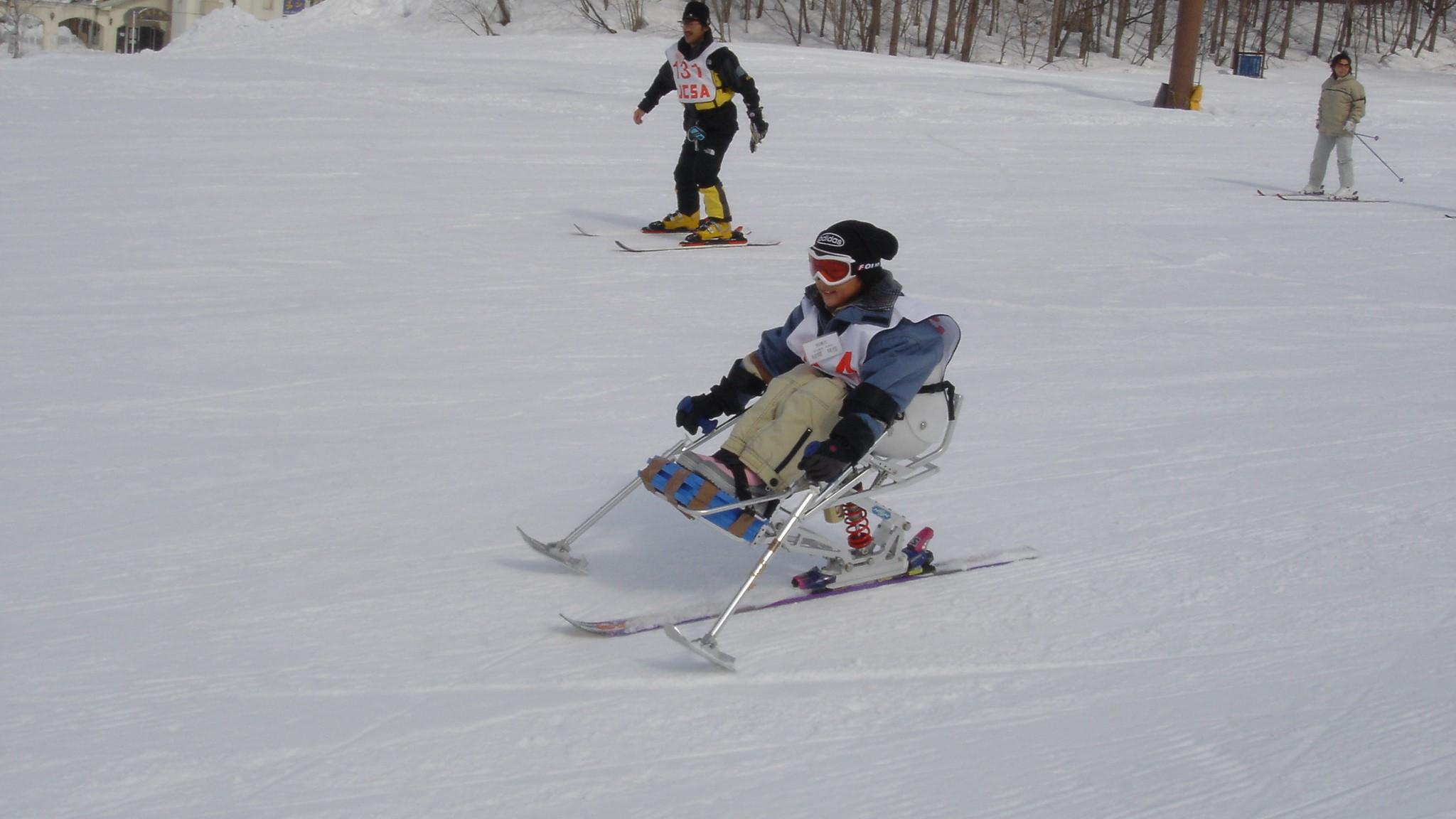
The more times she went, the more friends she made, and a former alpine skiing Paralympian even invited her to come and ski with others.
I was having fun free-skiing, but I later realized that the mentor was actually teaching me techniques such as carving turns so that I could apply them to competitive skiing.
At that time, there weren’t many junior skiers, so the mentor probably thought I was a kid who looked energetic, and let me ski with them.
From around the second grade in junior high school, I was invited to go and ski with the others at the Paralympians’ training base, and so I started skiing on the pole-lined competition ski course there.”
Then, in the first year of high school, Muraoka was selected for training as a junior athlete.
As the high school I went to was a private school, there were also lessons on Saturdays. Every Saturday afternoon my father would drive me from our house in Saitama to the training base at Sugadaira. At the base, my father would ski with me and provide support and then on Sunday he would drive us back to Saitama. This was a pattern we repeated every weekend.
Frustration leads to crowning glory at the PyeongChang 2018
In 2014, and while still in her second year at high school, Muraoka participated in the Sochi 2014 Paralympic Games.
From a young age I had dreamed of participating in the Paralympic Games and although I never imagined it would be in the skiing events, I was a little excited to see my dream come true.
As my event drew closer that excitement turned to fear. Usually I ski at places in the mountains where no-one is watching, but at Sochi 2014 there were lots of cameras everywhere and so many people watching. I felt really pressured in such an atmosphere, so it was only natural to be scared.
Muraoka participated in three events, and her highest placed finish was fifth. However, in her first Paralympic Games she found herself more frustrated than happy to have placed in the top eight in her event.
To be honest, I didn’t think I was good enough to win a medal at Sochi 2014. Even so, I could see the difference between myself and the other competitors, and I felt frustrated that I couldn’t ski to the best of my usual abilities. It made me strongly determined to win a medal at the next games and so it was a really good experience for me.
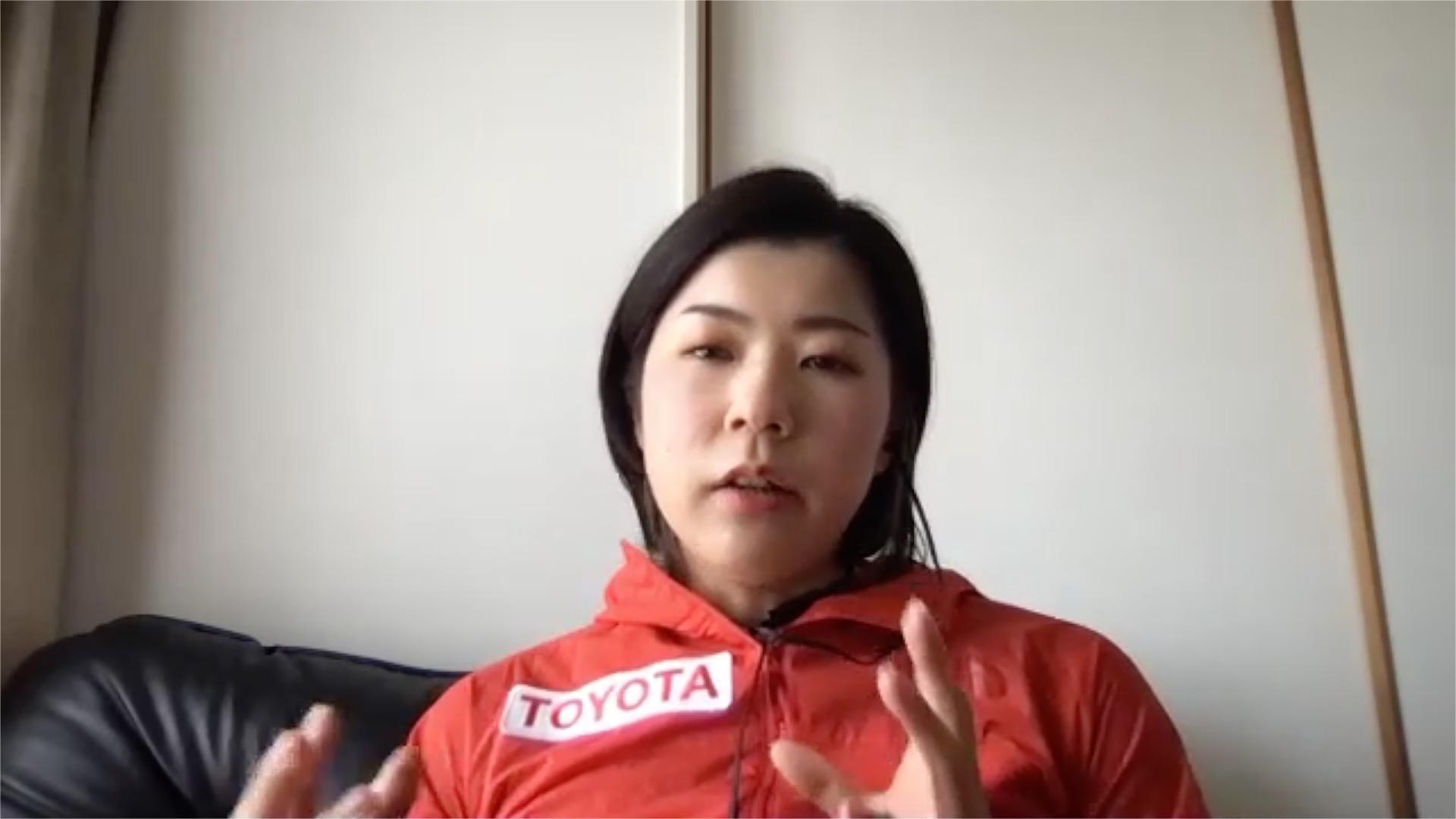
Athlete friends at university provide extra stimuli
Setting her sights on the next PyeongChang 2018, with her high school graduation approaching, Muraoka decided that she would like to enter Waseda University. At Waseda she joined the ski club, and in principle all members of the club have to live in a university dormitory. In order to accommodate Muraoka, the dormitory was refurbished to become barrier free.
The university kindly prepared the facilities, including changing conventional doors with automatic doors that open on the left and right, and putting in an elevator where there was a steep slope. I was really grateful and also glad because it will make the environment more accessible and livable for students who come after me, too.
At Waseda University, when she witnessed the attitude of her fellow students, who were seriously engaged in competitions, she felt the need to apply herself more strictly.
I had entered the Faculty of Sport Sciences and there were many athletes there. Seeing my friends who were sacrificing their daily lives to concentrate on their sporting endeavors, I felt that I couldn’t let them down.
For example, even when we were having meals together there was always someone who was striving stoically to either lose weight or gain weight. There was so much to learn from everyone.
As an alpine skier who traveled to the southern hemisphere to train during the summer months, Muraoka’s university life was extremely busy.
As I would be away from Japan for up to half a year, I would try to squeeze all my lectures into just half an academic year and gain the credits I needed. I even wrote my graduation thesis while away training, spending sleepless nights to complete it.
Even so, the overseas ski grounds are large and the snow quality is good, too, so it was all very enjoyable. Although barrier free facilities have made progress in Japan, too, I got the feeling that there are more opportunities overseas to feel the warmth and kindness of people who try to help, such as a kind old man always coming up to give me a push if I encountered a small step or bit of rough ground on the slopes.
At the PyeongChang 2018 Paralympic Winter Games, Muraoka won a total of five medals, including gold in the giant slalom, all the while balancing training with her university studies.
I really felt that I could win a medal, so there was some pressure. One of the biggest factors was that it was my second Paralympic Games, so knowing what to expect in terms of the atmosphere was very significant.
After PyeongChang 2018 Muraoka also claimed overall victory in the World Cup, and in spring of 2019 she set herself a new course. She simultaneously started three new aspects of her life, joining Toyota Motor Corporation, advancing to graduate studies at Waseda University, and taking up the challenge of becoming a Paralympian in athletics.
Toyota supports the challenge of becoming a competitor in two sports
With regard to her joining Toyota, Muraoka says, “People might think that this was due to my winning gold in PyeongChang 2018, but that isn’t the case.”
From the time I started competitive skiing in junior high school, people at Toyota, including Taiki Morii, a senior alpine skier, were really very kind to me. They did so much, helping and providing advice with everything from advancing to university to gaining credits.
Another important factor in my decision to join Toyota was the fact that the company was totally open to letting me pursue two different sports, skiing and athletics. It was very encouraging to hear from them that demonstrating a spirit of challenge is what is important and that they weren’t simply looking for results.
Muraoka says that since PyeongChang 2018 her desire to take up the challenge of field and track events in athletics has grown further.
At first my attitude was one of being slightly envious that the Paralympic Games would be held in Japan. As I had focused all my energies on PyeongChang 2018, I didn’t have any strong feelings for Tokyo 2020.
However, after PyeongChang 2018 was over, I started to feel that I wanted to try athletics again, something I had done as a child, and if there was even the slightest possibility I could compete, then I wanted to give it a try.
Another factor was that after PyeongChang 2018, I had found the Alpine Skiing World Cup very tough, as I faced race after race against a backdrop of people thinking that ‘Momoka can definitely win this.’ There were nights when I couldn’t sleep because I was crying while counting my World Cup points. To be honest, I was ready to take a break from skiing.
With the help of Toyota, Muraoka was able to train at the World Athlete Club, a training base for Paralympic athletes in Okayama. At first, she wasn’t able to even keep up with the warm-ups, but after two months of training as she travelled between her home in Saitama and Okayama, she managed to break the 100 meter Japanese record.
Although it might have been unexpected, the fact that she was able to set a new Japanese record in just two months is likely thanks to her natural talent, and also the physical strength she has developed through skiing.
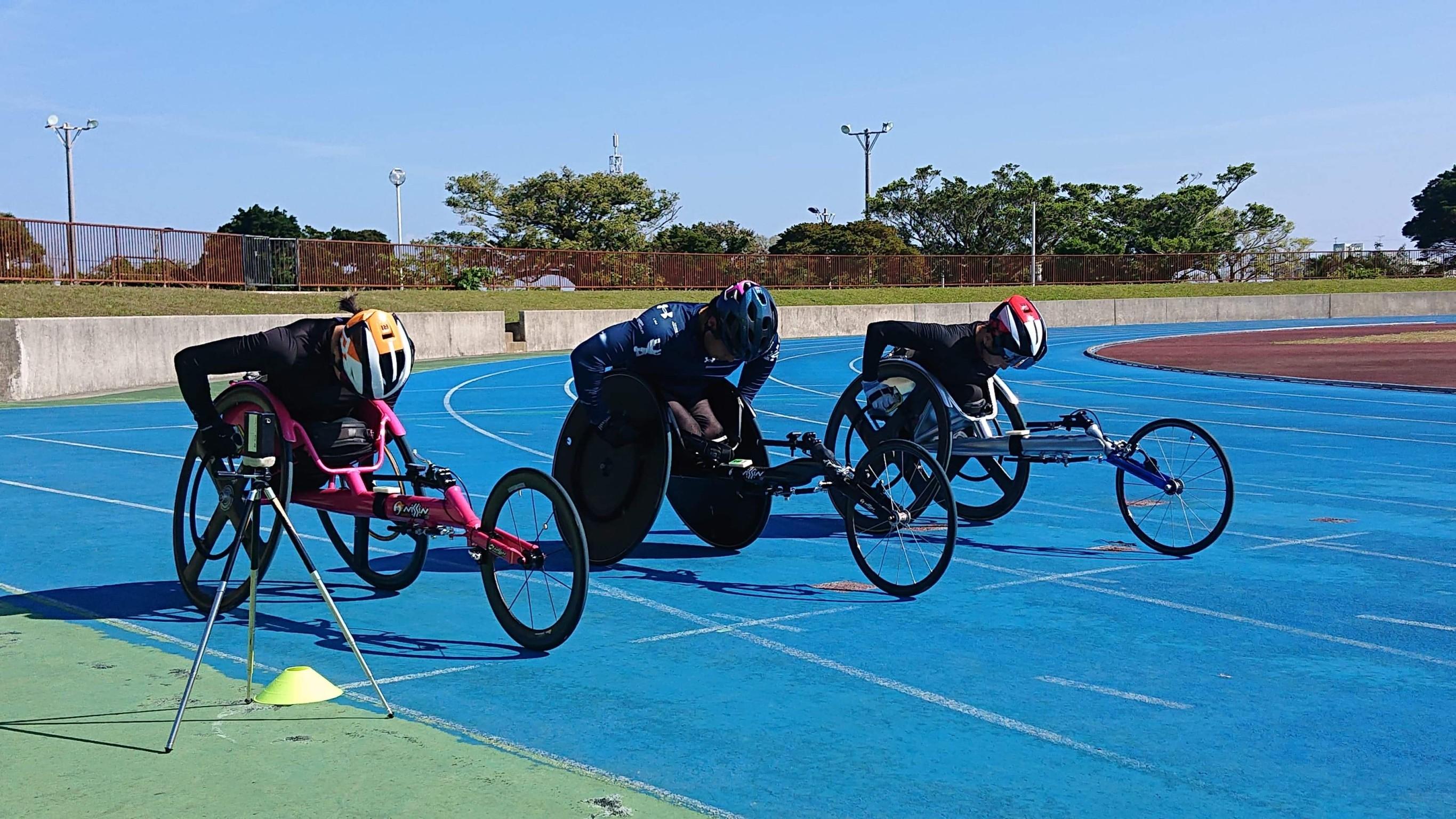
Taiki Morii a constant supportive presence
All seemed to be smooth sailing for Muraoka, when in March 2020 it was announced that the Tokyo 2020 Paralympic Games were to be postponed for one year. This means that there will be just six months between the Tokyo 2020 Paralympic Games in summer 2021, and the Beijing 2022 Paralympic Games.
I was really in two minds. I thought that if I were to aim for Beijing 2022, I should probably give up on participating in Tokyo 2020.
It was the abovementioned Taiki Morii who was there for Muraoka and helped her work through her concerns.
When I asked him for advice about whether it would be too difficult to try and compete in both games, it was Morii who said, ‘If anyone can do it, you can.’ It was these words that helped to put my worries to rest and it is thanks to him that I am now competing in two different sports.
When she was still an unknown junior high school student, someone was there to say, “You should come skiing with us,” and later on she was encouraged by the words, “If anyone can do it, you can.” Throughout her life there have been people there for her, whether it be her beloved father who encouraged her to take up wheelchair sports, her friends with whom she enjoyed wheelchair competitions and who invited her to skiing, and her respected mentor Morii.
It is through encounters with these people and their support that Muraoka has been able to make the unique challenge of competing in both skiing and athletics a reality.
(Text: Takeshi Saito)
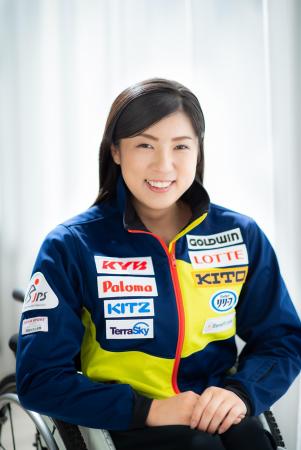
Muraoka Momoka
Para Alpine Skiing (Downhill, Slalom, Giant Slalom, Super-G, Super Combined)
Para Athletics (100m, 400m)
Born in 1997 in Saitama. At the age of four she became paralyzed due to an illness and was confined to a wheelchair. She discovered sit-ski in her third year of elementary school, and began competing in earnest in skiing events in her second year of junior high school.
She was selected to represent Japan at the Sochi 2014 Paralympic Winter Games and finished in fifth place in the giant slalom event. At the PyeongChang 2018 Paralympic Winter Games, she won medals in all five of the events she competed in. Also in 2018 she received the Medal with Purple Ribbon from the Government of Japan. She has also performed outstandingly in the IPC Alpine Skiing World Cup. In 2019 she claimed multiple medals in the World Para Alpine Skiing Championships.
Also in 2019 she started competing in para athletic track sprint events, and is currently the holder of the Japan national record in the 100m T54 class. She belongs to Toyota Motor Corporation, and her hobbies are reading and watching anime.

